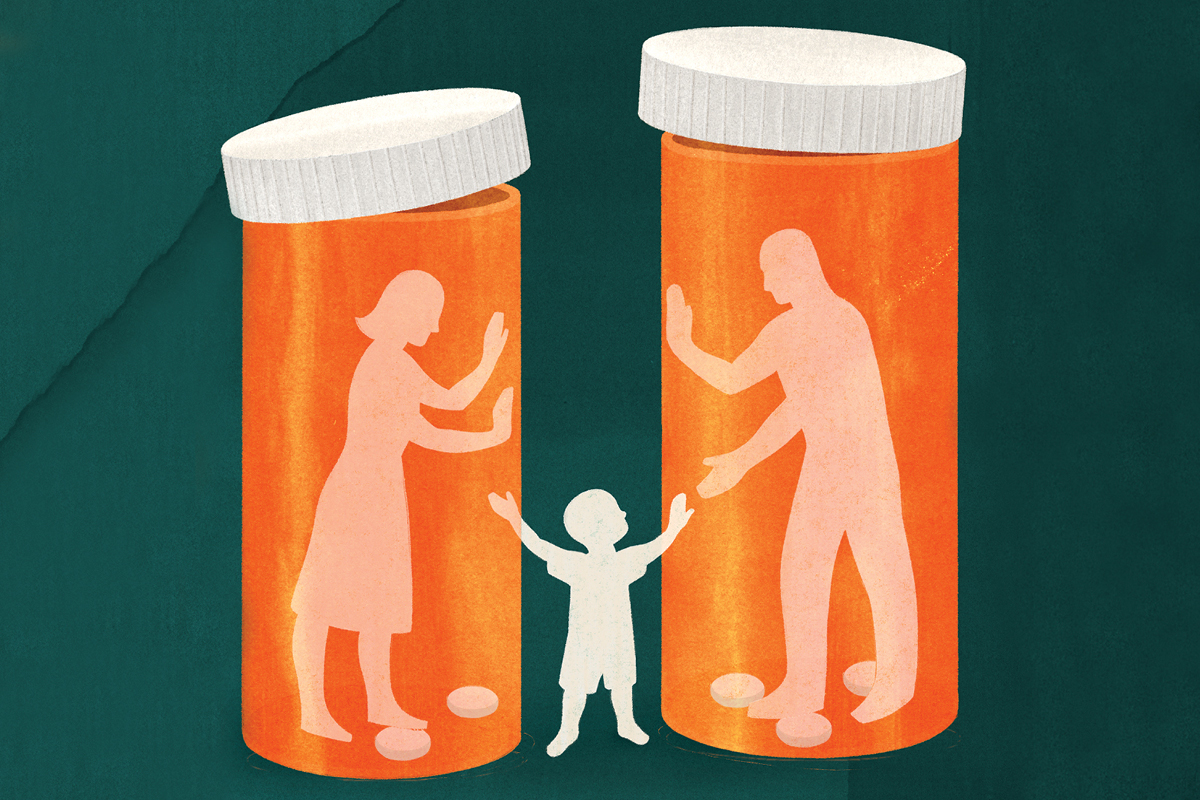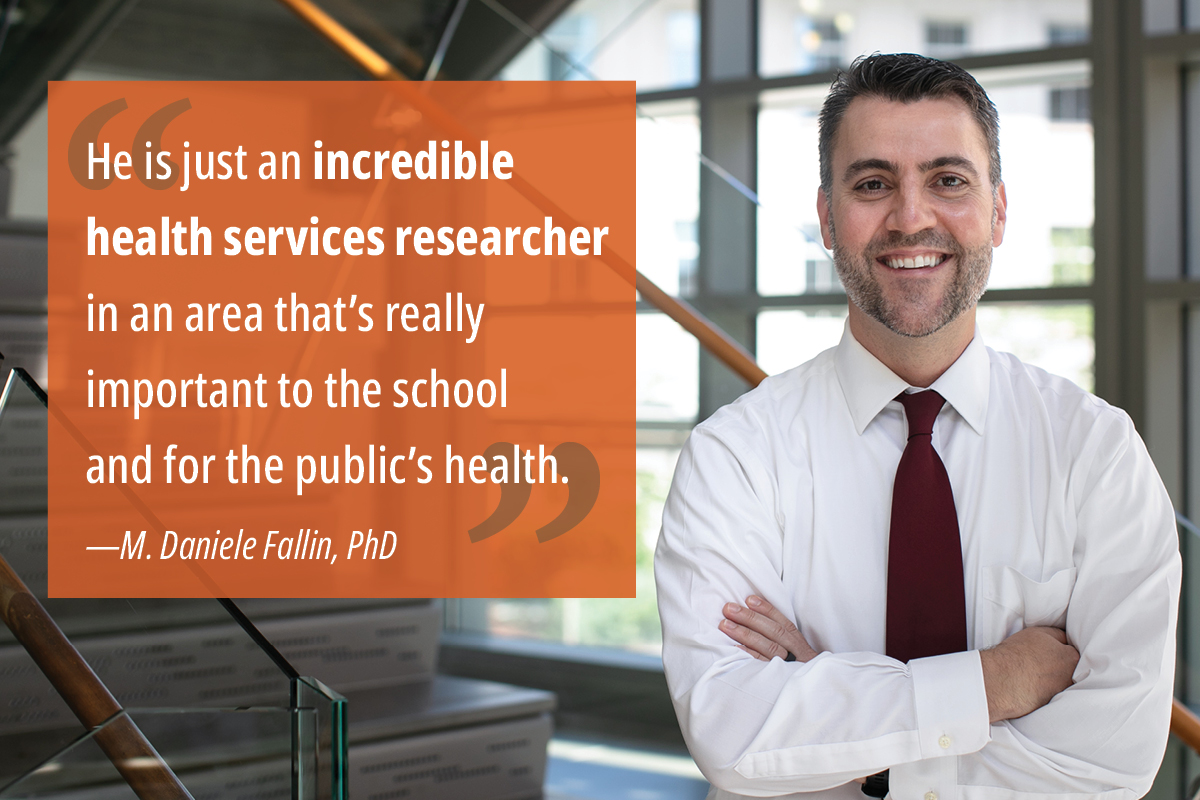Bridging Patient Care, Polling, and Policy
Neonatologist Stephen Patrick joins Rollins as chair of health policy and management.

Around 2010, Stephen Patrick, MD, noticed a disturbing trend at the neonatal intensive care unit at the University of Michigan.
“We started seeing more babies having opioid withdrawal, and those infants really stood out because, in a sea of infants who were critically ill, these were kind of big, fussy, irritable infants,” he recalls. “And people weren’t really talking about it. So it really led us to ask, ‘What’s going on?’”
In these situations, many people initially blame the mothers. But, if you let go of assumptions and ask the right questions, Patrick says, you’ll quickly learn that the issue runs much deeper. “You learn about barriers to treatment,” he says. “You learn about people’s trauma, lack of economic opportunity, the layers of things that fall into place.”
Patrick, the new chair of the Department of Health Policy and Management, was riveted and deeply disturbed. At the time of these cases, he was the father of a young daughter (and another soon to follow). He couldn’t bear to see the infants and mothers suffer. He dove into research on pregnant people’s access to opioid treatment. His research quickly gained prominence through publications in top medical journals like JAMA.
After finishing his training, Patrick took his work to the national level, becoming a policy adviser at the White House. Over the next few years, he testified multiple times before Congress on neonatal abstinence syndrome (when babies withdraw from drugs they are exposed to before birth), reviewed policy on medication-assisted treatment (MAT), and led the development of the Biden-Harris administration’s action plan to support pregnant people battling substance use disorders. More recently, he conducted a poll showing widespread voter support for policies that support child health, ranging from child tax credits to free school meals.
Finding Access to Care
In West Virginia, the state where Patrick was born, 1 in 25 infants are in foster care, many due to parental substance use. In Patrick’s home county, up to 5% of infants are born experiencing drug withdrawal. Meanwhile, health wsxcare—both for substance use treatment and delivery—is harder to find than ever.
“The hospital where I was born doesn’t even exist anymore,” he says. The shortage is emblematic—and a driving factor—of the state’s struggles with poverty, health problems, and substance use disorders.
As a result, the remaining health care centers in the state have been overwhelmed, making it even harder to find treatment.
To find out more about the intersecting crises, Patrick developed an innovative study to examine opioid treatment barriers from the patient perspective. He carried out a “secret shopper” study encompassing 10 states in which women called MAT providers listed on government websites. Half the time, participants weren’t even able to get someone on the phone after at least five attempts. Of the participants who were able to get in contact with treatment programs, the “pregnant” people were 17% less likely to be accepted for treatment. Many participants also reported that the person who answered their call was unkind or judgmental.
Some states have enacted policies that prohibit such discrimination against pregnant people in treatment program admissions. Patrick examined those in a separate study. “We found them to be largely ineffective,” he says.
In addition, “We’re seeing record levels of pregnant women dying from an overdose,” he says. “We have to be able to do this better.”
So he did.
From Polling to Policy
In 2020, Patrick became executive director of Firefly, a Vanderbilt program that cares for pregnant people with addiction. Its specially designed infrastructure integrates obstetrics, psychiatry, MAT, peer support, and connections to food banks and other resources.
Over the past two and a half years, about 350 mothers have gone through the program. Patrick was especially touched by one patient, who was getting her first ultrasound when the sonographer asked if she had found a home [meaning, adoption placement] for the baby yet.
“Because people who use drugs never end up with their baby, it’s almost a foregone conclusion [that they will have to give the baby up for adoption],” Patrick explains, becoming emotional. “I have two girls, and I can’t imagine that feeling. It’s supposed to be a happy moment, but that’s what you’re faced with. So she found her way to our program, got into treatment, and here she was [telling her story to a radio audience] holding her 15-month-old baby, both thriving and doing well.”
Because of programs like Firefly, her story isn’t unique. This past summer, Patrick published a paper showing that opioid treatment during pregnancy improves a parent’s likelihood of maintaining custody. The first of a series of articles, this research has important applications for helping programs access funds aimed at preventing children from needing foster care. And a little prevention can go a long way.
“I’m a pediatrician, so I’m an optimist,” he says. “I think these things are changing. I know they are because I’ve seen them incrementally get better.” Patrick speaks from experience: His work has helped shift treatment paradigms to be more family-centric, leading to improved clinical outcomes and patient satisfaction.
“It gives us this ability to say, ‘Hey, this doesn’t have to be this way,’” Patrick says. “And we can think about how to transform not just one person at a time, but systems and communities. And that’s what public health is all about.”
 A Spectrum of Perspective
A Spectrum of Perspective

Patrick’s ability to bridge clinical work, research, and public health made him stand out to recruiters at Rollins. “We were thrilled by Dr. Patrick’s deep research expertise, his work engaging in health policy discourse, his experience building new research initiatives, his strong focus on mentorship throughout his career, and his core principles that align well with our school,” says Don Operario, PhD, Grace Crum Rollins Professor and Chair of Behavioral, Social, and Health Education Sciences, who led the search committee for the Department of Health Policy and Management chair.
“He’s actually the doctor caring for those babies, so he really has a perspective of the whole family,” explains Dani Fallin, PhD, dean of the Rollins School of Public Health. Furthermore, Patrick’s expertise in polling helps researchers match what communities want with the policies that can meet those needs. Fallin admires how his passions span from “individual patient care to population health and how policies affect that population. It’s a wonderful spectrum of perspectives.”
“He is just an incredible health services researcher in an area that’s really important to the school and for the public’s health,” she says, referring to Rollins researchers with similar interests, such as Hannah Cooper, ScD, Rollins Chair of Substance Use Disorders Research; Janet Cummings, PhD, professor of health policy and management; and Ben Druss, MD, Rosalynn Carter Chair in Mental Health; as well as colleagues in the School of Medicine. “It’s a wonderful fit in terms of the research that we do, the values that we have as a school, and where we’re moving forward.”
Because so much of the work in other departments depends on the translation of research to policy, “the Department of Health Policy and Management is critical to a thriving school of public health,” Fallin adds.
These policies become even more impactful when medicine, nursing, and public health join forces. And as a neonatologist, researcher, and policy expert, Patrick is poised to facilitate those relationships.
A Team Effort
For Patrick, everything is about collaboration. When pressed to talk about his achievements, he always circles back to the power of teamwork. “None of this has just been me,” he says. “It’s really been about the team.”
As he prepared to join the Rollins team, he met with staff and students to learn more about the department and their visions for it. According to Fallin, Patrick regularly asks people questions like, “How can I do what’s best for the faculty, staff, and students in the department? How should I use my time to effectively promote them and see them thrive?’”
“[During the interview process] I, and many who met him, were very impressed with his ability to listen, his ability to be very thoughtful and reflective, and his ideas for how to create community and nurture community,” Fallin says.
Operario concurs. “He comes to Rollins with excitement to co-create collaboration and boundless energy to make things happen,” he says.
Patrick wants to build a community where people are genuinely excited to come to work every day, where they feel supported by their colleagues, and where they have access to the tools they need to pursue their passions. He looks forward to expanding access to career-advancing tools such as mentorship, coaching, and skill-building opportunities.
He’s already bringing these plans to life. “There are things in the works,” he hints. “We’re working on some collaborations with the Department of Pediatrics focused on improving the mental health of children not just in Georgia, but across the country.”
Meanwhile, he’ll be co-directing the Center for Health Services Research at Emory School of Medicine. “This is going to be a place where we’ll build collaborations across campus,” he explains. He envisions shared conferences between public health doctoral students and medical school trainees, fueling partnerships for better health care management.
Over the summer, he moved to Atlanta with his two daughters, who are now 19 and 13, and his wife, Kelly. “And we have our dogs,” he adds, three rescues “who like to bark.” So far, the whole family has loved the city, filled with friendly people and plenty of places to walk (and bark).
He’s also settling into his new office. It’s still a work in progress, but Patrick already has brought in boxes of family photos, his children’s artwork, and Florida Gator bobble-heads.
“We have that Gator love in common,” laughs Fallin, who also is an alum of the school where Patrick’s older daughter currently attends and where Patrick met his wife. “They’re both really engaging people who want to talk not only about whether Schitt’s Creek was the best show ever made, but also about what policies are going to be most important for the opioid crisis and beyond.”





